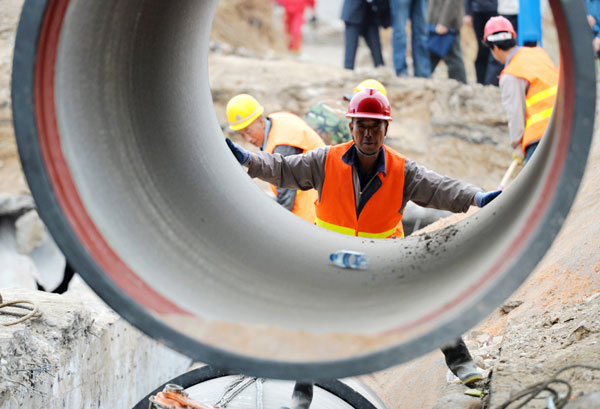China looks to upgrade pipeline networks
Updated: 2014-06-16 08:17
By Zheng Jinran (China Daily)
|
||||||||
|
 |
| Workers put new pipes in a ditch in Lanzhou, Gansu province, in April. The city is updating its obsolete water pipes to protect the water supply. CHEN BIN/XINHUA |
The move will require close cooperation among different departments, which will present challenges, experts said.
The country will finish the study on the complex underground pipeline networks in cities by the end of 2015. The governments then will create a new management system for the networks and work out a comprehensive plan on the urban underground pipelines, said the guideline, released by the State Council on Saturday.
In 10 years, the country will have well-functioning underground pipeline networks in cities, it said.
"The national guideline will push the governments at the grassroots to pay more attention to the underground pipelines, enough to reveal problems," said Li Xun, vice-president of China Academy of Urban Planning & Design, based in Beijing.
But he has doubts that the government will finish the national evaluations in more than 660 cities within 18 months, saying that financing will be a major stumbling block.
Yang Hongshan, professor of urban planning at Renmin University of China, agreed with Li on the limited allocation of resources in the underground pipeline networks. The study and upgrades will require a huge amount of money from the governments, while many of them cannot afford it. In addition, some of them are unwilling to do it because the underground pipeline work is not as obvious a political accomplishment as work aboveground.
In addition, the underground pipelines serve different departments, and the multiple management, which is usually not coordinated, poses many obstacles to upgrading, the two experts said.
The guideline needs to specify the responsibilities when setting up the unified management platform, they said.
The massive pipelines running underground play a major role in urban development, carrying the water, sewage, gas, electricity, telecommunications, cable signals and other necessary supplies for daily life as well as the industrial production.
However, along with the rapid urbanization in China, the larger cities with fast-growing populations witnessed more accidents with severe economic losses and casualties.
For example, an explosion in a gas line in Qingdao, Shandong province, in November killed 62 people and injured 136.
Leakage in a petrochemical pipeline contaminated the water supply in Lanzhou, Gansu province, in April.
On May 11, a torrential rain hit Shenzhen, Guangdong province, flooding more than 2,500 roads in the city and causing an economic loss of about 80 million yuan ($12.9 million).
"The main reason for the flooding inside the city is the out-of-date underground sewage pipelines," said Qiao Jianping, chief engineer of Shenzhen Urban Planning & Design Institutes.
He said that the cities expanded to cover some rural areas, while many of them did not have the urban underground network, showing the lack of management from the government.
"When planning such networks, the decision-makers should consider coordination among different regions, especially with rural areas," he said.
Contact the writer at zhengjinran@chinadaily.com.cn

 World Cup fever grips Chinese soccer fans
World Cup fever grips Chinese soccer fans
 Alibaba documentary maker wants his Crocodile on US TV
Alibaba documentary maker wants his Crocodile on US TV
 Consul general welcomed
Consul general welcomed
 Tender moments of world leaders with their children
Tender moments of world leaders with their children
 Chinese fleet joins others for RIMPAC exercise
Chinese fleet joins others for RIMPAC exercise
 Obama visits native American reservation
Obama visits native American reservation
 Clinton has reasons to run at her ready
Clinton has reasons to run at her ready
 Angelina Jolie shines at summit against sexual violence
Angelina Jolie shines at summit against sexual violence
Most Viewed
Editor's Picks

|

|

|

|

|

|
Today's Top News
US should 'attune itself to China's rise'
Former US congressman: Diaoyu belongs to China
US options could help combat advances by Iraqi militants
US applauds voting in Afghan presidential polls
Oregon high school shooter's parents offer apology
Army: Bergdahl 'looked good' after returning to US
Envoy rebuts Vietnam, Philippines on sea issue
Cui: China poses no threat to US
US Weekly

|

|







